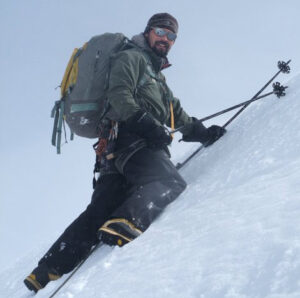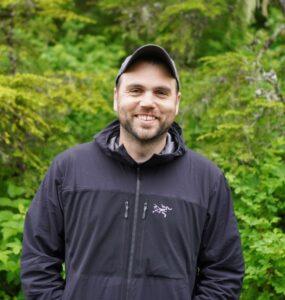About us
Meet your virtual/in-person hosts and organizers and please feel free to email anyone one of us with questions or feedback.
Dr. Seth Campbell– Assistant Professor, University of Maine – School of Earth and Climate Sciences and Climate Change Institute.

Bio: I’m a Research Assistant Professor working on several federally funded grants with colleagues from the University of Maine and other institutions. I am also the Director of Academics & Research for the Juneau Icefield Research Program, the longest operating polar research and training program for undergraduate students in North America. Over the past decade, I have conducted glaciology, geology, and near surface geophysics research using a range of observational and numerical methods. I have broad interests in the cryosphere with an expertise in applying ground-penetrating radar to glaciological, periglacial, and glacial geology studies. I have participated in over 50 field expeditions for research in Alaska, Canada, Greenland, South America, Antarctica, and the continuous United States.
Contact:
Email: scampb64@maine.edu
More about Seth. Click here to visit Personal Website.
Dr. Deborah Shulman – Research Faculty, University of Maine
Bio: I am a research faculty at the University of Maine where I work with K-12 educators, graduate students, and faculty in the pursuit of improving science, technology, engineering, and mathematics (STEM) education. Over the past five years I have worked on a variety of grants at the Center for Research in STEM Education at the University of Maine (RiSE Center) to support K-16+ educators in Maine to improving teaching and learning in STEM classrooms. I truly enjoy collaborating with teachers from all walks of life and at all levels in creating, implementing, and distributing engaging, hands-on lessons for STEM classrooms.
Contact: deborah.shulman@maine.edu
Scott Braddock – PhD candidate, University of Maine – School of Earth and Climate Sciences and Climate Change Institute.

Bio: I study past and current climate change in Antarctica, Patagonia and Alaska. With the aid of ground-penetrating radar, other geophysical methods and a range of paleoclimate proxies, we can better understand how glaciers are reacting to changes in the atmosphere and oceans.
Contact:
Email: scott.braddock@maine.edu
More about Scott.
